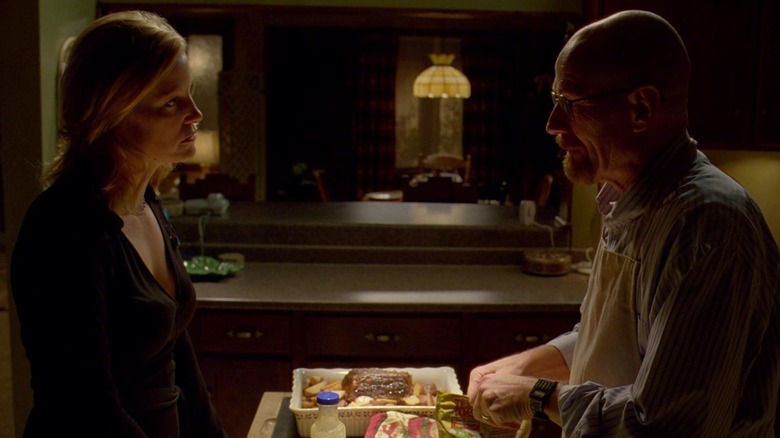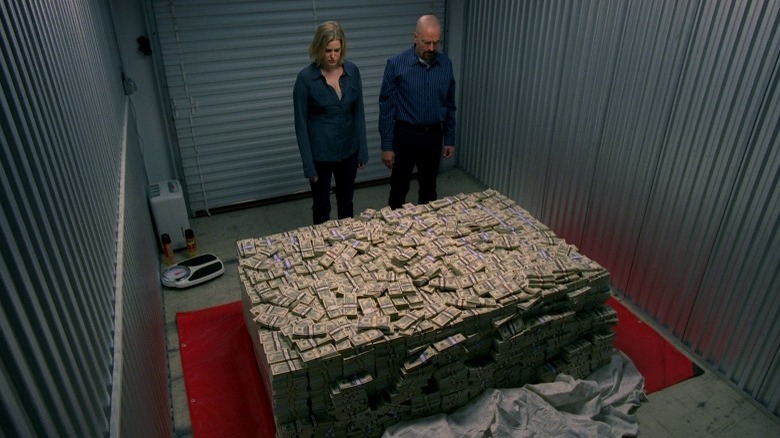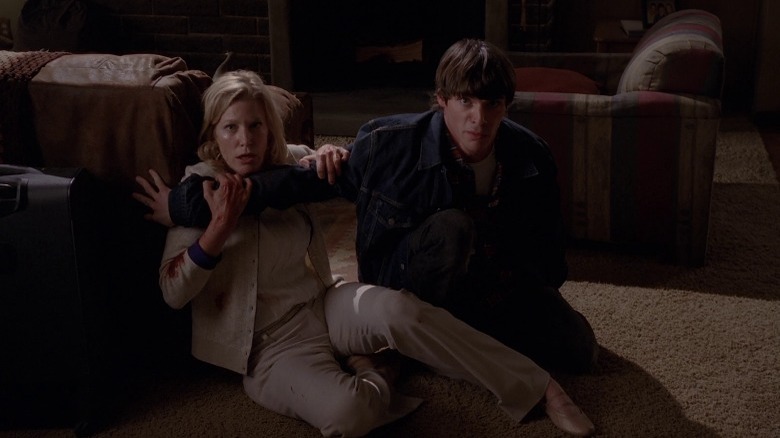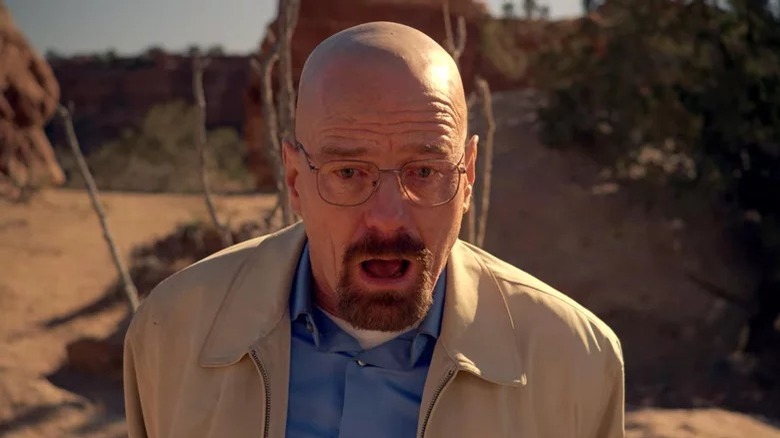Breaking Bad's Writers Almost Killed Off Skyler In Season 5
It's no secret that the writers of "Breaking Bad" preferred going without a strict plan. Much like antihero protagonist Walter White (Bryan Cranston) often found himself "MacGyver-ing" his way out of sticky situations, the show's writers needed to be flexible. Jesse Pinkman (Aaron Paul), the show's heart and soul, had been planned to die at the end of the first season. Mike (Jonathan Banks) the fixer was the result of a last-minute casting fix. And just about every deviation the show made from its original plan made it richer, more unpredictable, more exciting.
For showrunner Vince Gilligan, a lot of that flexibility came down to having a great writing staff. As he told the AV Club after the show's third season, "I've got a lot of really smart people in the room with me and I'm very lucky for that." If a plotline needed to be changed, they could do it and make it even better.
Still, some hypothetical plot points are curious at the very least. When it came to the show's explosive, self-destructive ending, the writers had multiple potential routes to take, and the trick was finding the right one.
As Gilligan would eventually reveal, many hypothetical stories came up in the writers' room. One of them was the suggestion that Walt's long-suffering wife Skyler (Anna Gunn) would die as a result of suicide. By the show's final stretch, Walt's fragile double life has been completely shattered and Skyler has seen the extent of her husband's pragmatic sociopathy. It wouldn't have been entirely out of left field, but the ending they went with was better.
Drowning
Even though Skyler is not connected to organized crime in the way Walt's many enemies are, she is probably his most significant obstacle. Walt's struggle is his double life, walking the line between his life as a drug kingpin and his life as a normal, cancer-ridden father. While they have two kids, the picture of the "normal life" is Skyler.
During the show's 10-year reunion panel, it was revealed the writers decided early to bring Skyler in on the crime, tying her directly to the show's dramatic focus. As the walls between the sides of Walt's life dissolve, Skyler learns more about the crimes he's committed and the increasingly evil man to whom she's married. She feels the effects of his criminal work more visibly than anybody else in Walt's life. She knows enough to fear Walt and hate him, but soon becomes entrenched in the lifestyle in the exact same way.
She helps to launder money for Walt's dealing, but can't bear the pain of seeing her husband's monstrous extremes. During his 51st birthday in the show's final season, she attempts to drown herself in the family pool before being rescued by Walt.
In many ways, Skyler's perpetual antagonism towards Walt led to hatred from the show's fanbase, who at their worst saw the show as a misogynistic power fantasy. Where Skyler's arc was a complex study of complicity and psychological abuse, many seemed to see it as evidence of her hypocrisy, or that she deserved what she got. If the show had followed through on the initial suggestion of her suicide, the writers would have made the wrong call.
Potential threads
Shortly after the traumatic birthday celebration, Skyler and Walt come to an uneasy peace, with Walt's drug empire protected from law enforcement and potential threats in jail, whom Walt has dispatched with the help of neo-Nazis. As she shows him what his riches have produced, he realizes there's no more to do, no place to go. He abandons the empire, only for DEA Special Agent brother-in-law Hank (Dean Norris) to finally realize Walt's secret identity. The White family's life comes crashing down in the show's final stretch.
As Walt's involvement with the neo-Nazis results in Hank's death, he and Skyler come to blows, resulting in him skipping town with the help of a disappearer (Robert Forster). From there, the show leads into its richly moralistic ending, with Walt losing everything and using his know-how to achieve something like redemption, including a substantial nest egg for his surviving family.
But, in the extensive writing process for the show, many potential threads were brought up according to The Wrap, including Walt using the M60 machine gun he picked up in the season's first scene as a Rambo-esque figure in multiple scenarios. Every possibility introduced more possibilities. In one iteration, Skyler and the children disappeared as well, but the writers couldn't figure out how to get Walt, Jr. (RJ Mitte) to go along with the plan.
The ending
The potential death of Skyler hung over many of the writers' discussions. With her suicidal reactions to Walt's behavior established earlier in the show, it had to exist as a possibility, the ultimate symbol of Walt's destructive impact. By the show's end, Walt had crossed every moral line that existed, breaking bad so far that his only reasonable enemies were literal neo-Nazis. There would have been some truth to Skyler's killing herself.
How it would have manifested, according to Vince Gilligan in The Wrap, was that Walt and Skyler could have ended up in a climactic situation together, with the tension between them rising to extreme levels. As Gilligan claimed, the storyline would have had Skyler and Walt "tied up at a Motel 6 kind of place and he's talking to her in a bathroom saying, 'It's going to be alright ... I've got a plan. Skyler? Skyler?'" At that point, he would open the bathroom door, and see a bathtub full of blood. Vince Gilligan would have changed nothing about "Breaking Bad," but if the show had settled for such an ending, it might have been regretful.
What makes the actual ending of the show work is that Walt largely has to suffer the consequences of his actions alone. As penance for his crimes, he needs to secure some kind of positive fate for the few survivors in his life, whether it's Skyler or Jesse (who at that point has been imprisoned by the neo-Nazis for months). If Skyler killed herself, it would not only have been incredibly bleak even for "Breaking Bad" — it would have continued to pass the buck of Walt's retribution.



